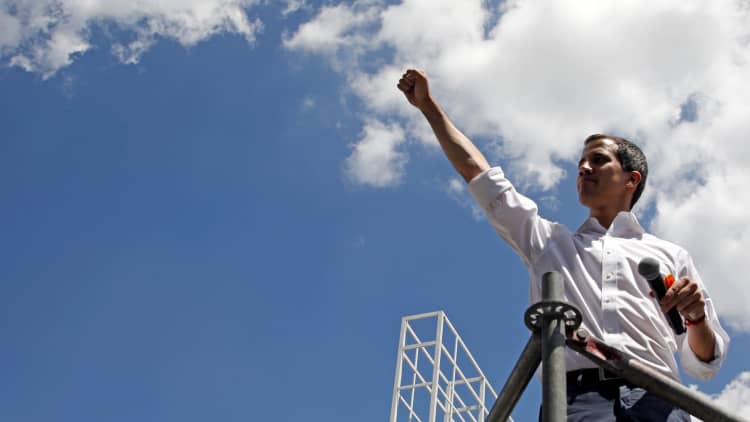
Venezuela's opposition leader Juan Guaido has promised to return to Caracas over the coming days, despite threats from the government of President Nicolas Maduro.
Speaking alongside Brazil's right-wing President Jair Bolsonaro at a press conference in Brasilia on Thursday, Venezuela's Guaido urged the international community to enforce economic sanctions against Maduro "so that everything is not robbed in Venezuela."
Guaido has met with several Latin American leaders over the past week, in an attempt to shore up diplomatic pressure against Maduro's embattled administration.
The leader of the country's National Assembly said the purpose of his regional tour was to discuss the best course of action to defeat Maduro's regime and to prepare for the country's reconstruction.
When asked whether he was worried about his safety on returning to Venezuela, Guaido told reporters at the press conference in Brasilia: "Of course, it is a risk — even life threatening."
'Peaceful restoration'
Venezuela is in the midst of the Western Hemisphere's worst humanitarian crisis in recent memory.
On Saturday, at least three people were killed and hundreds more were left injured, Reuters reported, as opposition activists tried to defy a government ban to bring food supplies, hygiene kits and nutritional supplements into the country.
The aid showdown between opposition activists and security forces loyal to Maduro took place exactly one month to the day after Guaido invoked constitutional provisions to declare himself as the country's rightful interim president.
More than 50 countries, including the U.S. and most Latin American and European countries, have since recognized Guaido as Venezuela's legitimate leader.
It has thrust the oil-rich, but cash-poor, country into uncharted territory — whereby it now has an internationally-recognized government, with no control over state functions, running parallel to Maduro.
Guaido said on Thursday that he and his family had recently received threats of imprisonment. It follows an order from Venezuela's Supreme Court that he should not leave the country pending an investigation.
However, Guaido insisted he would to return to Caracas over the weekend.
The U.S. has said it is still working on plans to get humanitarian aid delivered to Venezuela, as the crisis-stricken country continues to suffer from chronic shortages of basic products — such as food and medicine.
Last week, U.S. Secretary of State Mike Pompeo tweeted that Washington would "take action against those who oppose the peaceful restoration of democracy in Venezuela."


